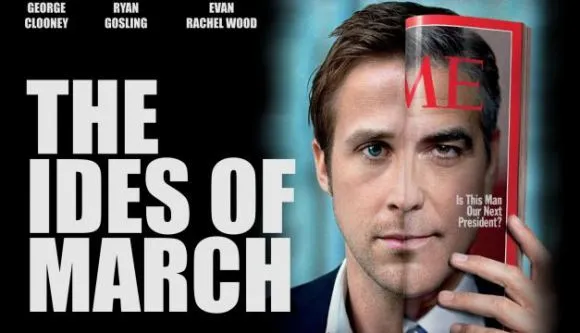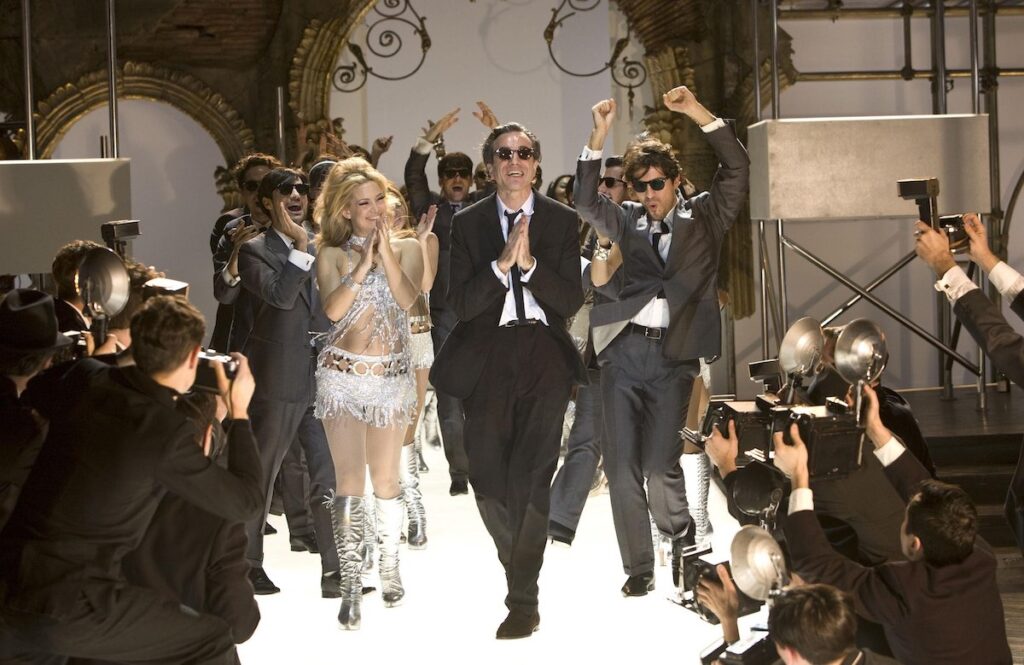The Ides of March is a movie about American politics and the Shakespearean title, the handsome talented cast, the opening line, “I’m not a Christian, I’m not an Atheist. I’m not Jewish. I’m not Muslim. My religion, what I believe in, is called the Constitution of the United States of America.” all raise your expectations that you will be swept into a Machiavellian political drama. Unfortunately the Ides of March does not reveal much; only confirming what we already know about politics and how it corrupts the soul, and that the means are always justifiable to meet the ends. Not only is the message/theme antiquated but so is the story, plot, directing and angle. It’s quite entertaining in its Hollywood bright lights, but simply does not quench one’s thirst.
Beau Willimon’s “Farragut North” is the play from which the screenplay of the Ides of March is adapted. Farragut North is a metro-stop in Washington D.C. in the heart of the lobbying street, which makes it an intriguing choice for a title because it reflects all the undercurrents, and stealthy negotiations that happen in any political American race. Willimon had worked in campaigns as a young man, hence he was inspired to recreate the mood, and drama found on campaigns in his play.
The Ides of March was nominated for best adapted screenplay five times, and won at the Australian Film Institute (AFI). However I would argue that The Ides of March lacks the entertaining, playful, witty political banter that Aaron Sorkin is so skilled at creating. Many movies and TV shows claim to have a Sorkinesque quality, like Sorkin’s “West Wing” and “The Social Network”. For example, David Mamet’s “Wag the Dog” and Jeremy Larker’s “The Candidate” are two political dramas who have it right. In both, the story is complex, the plot is intriguing, exciting and unpredictable. The characters are well developed and believable and most of all the writing creates the perfect atmosphere- intense tension combined with a cold eerie comic tone; the passive aggressive comedic tension/banter that is usually used in politics when deals are made is non-existent in this political drama.
The writing does not match the drama and leaves the viewer wanting more, like in the confrontation between Stephen and Tom Duffy when he tries to steal him from his opponent’s campaign, “You stay in this business long enough you get jaded and cynical”. The deal of accepting the despised Senator, as Secretary of State in order to guarantee the primary, is made less of an issue than the sexual affair. Another example is when Zara confronts Stephen for having betrayed him by having met with the opponent’s campaign manager without telling him. “It doesn’t matter what you thought, it doesn’t matter what you did, it matters what you didn’t do”.
The only two women in the movie are spiteful & backstabbing, whether it’s Ida the New York times reporter who will stoop to any level including blackmail to get a story or the intern Molly Stearns who’s solely on the campaign because of her father who’s the head of the Democratic National Committee (DNC). She not only sleeps with the Governor/Clooney who is running for President, and potentially ruins his career, she also sleeps with his campaign’s assistant manager (Stephen), who had naively/unrealistically for the first time truly believed in a candidate; “I’ve worked on more campaigns than most people have by the time they’re 40. He’s the only one that’s actually going to make a difference in people’s lives.” So Molly is not only unscrupulous, but she leads to the start of the drama and to the eventual downfall of all the male characters just like Eve deprived Adam of Heaven. It makes me wonder if this is really an insight into Clooney’s perception of women and why he is always single and toggling a new face in front of the cameras.
Everything falls apart and the naïve assistant campaign manager (Stephen) who is enamored with the Governor (Clooney) and believes he is the one that can really change America, realizes the truth about his affair and the Governor/Presidential Candidate falls from grace.
How can Stephen be so naive; “I’ve worked on more campaigns than most people have by the time they’re 40.” If this is true then he would not be so gullible and believe that one person can make a difference. The reality of the American political organism is that the “System” is so strong that it limits any one person’s ability to make a difference. It’s a team effort. The campaign is a success because of the team and instead of seeing the opponent’s candidate or how they can win. The movie rotates in a very small circle around Stephen, the Governor and the infidelity.
Even the infidelity is not dealt with at length. The abortion takes more time in the movie and the lead up to it. Then the unexplained surprise suicide, which doesn’t make sense at all. Why would she sacrifice her life for the Governor’s? She didn’t regret having slept with the Governor, she didn’t leave the campaign, quite the opposite she initiated a relation with Stephen. A confident young woman, from a strong political, well off family, wouldn’t just commit suicide without a lot of pressure and manipulation. However, this scene is very short and unfulfilling. How about her family’s reaction, her father the head of the DNC? Wouldn’t they want to know what happened? Wouldn’t they make sure an investigation was underway? Why would she feel compelled to suicide? Wouldn’t the coroner’s report show that she was bleeding from the abortion? All these issues/loose ends are not even tackled.
The directing is quite good and this is where Clooney resembles Redford and has talent to show for it. The way the camera angles on Gosling’s features in the beginning and the end, with the faint lighting, are very powerful and dramatic. Personifying the transformation, without a word. The choice of where the key conversations take place, as well as the confrontation between Stephen and the governor in the dark empty restaurant kitchen filled with knives, and the casual insightful conversations between the governor and his staff in the limousine, in the airplane, in his hotel room are all very effective. The black car with tinted windows coming up to Zara, with only music, a rolled down window, an expression. Followed by the scene where Stephen is now in charge instead of him and managing the campaign. These smooth transitions, and the intriguing flow of the movie are one of Clooney’s many talents. Clooney is able to make a star out of Ryan Gosling in this movie, he outshines the rest and many believe he is turning out to be the new “Jean Premier” of Hollywood.
So overall, not the most memorable of movies, and the morality tale that sex scandals end up tainting politicians’ careers, more than actual manipulation of elections, is historic and global. One would hope that movies either give us a refreshed or insightful perspective, or something new and fascinating. The Ides of March does neither and leaves us dry.



